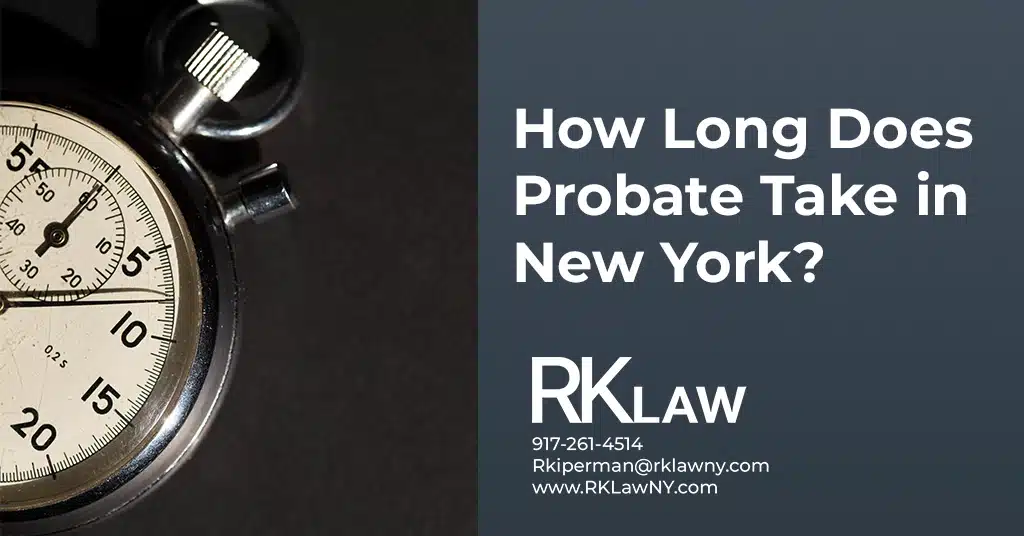Probate, the legal process posthumously ensuring the proper distribution of assets and settlement of debts, prompts the question, “How Long Does Probate Take in New York?” In this blog post, we’ll delve into the duration of probate in New York, explore influencing factors, and highlight essential steps, including securing jurisdiction over distributees through waivers, consents, or Citation.
Depending on facts and circumstances, probate can take as little as 9 months or as long as 10 years.
How Long Does Probate Take in New York? Factors Influencing Probate Duration:
1. Estate Complexity:
– The complexity of the deceased person’s estate is a key factor. Larger estates with intricate financial structures may extend the probate timeline. For example: if the probate asset consists solely of cash in the bank, this can be resolved faster than if the probate asset consists of a house with a tenant that needs to be sold.
2. Debts and Claims:
– Resolving outstanding debts and claims is crucial. Disputes or creditor challenges can contribute to delays in the probate process. For example: resolving a dispute over an unpaid hospital bill is faster and easier than resolving a claim for services rendered to the Decedent by a friend or family member who is now seeking compensation.
3. Court Procedures:
– The efficiency of the Surrogate’s Court influences the timeline. Court procedures, document reviews, and hearing and Court conference schedules contribute to the overall duration.For example, if you have a contested probate proceeding, it will take a longer time to resolve than an uncontested matter where everybody agrees.
4. Beneficiary Cooperation:
– Beneficiary cooperation is vital. Disputes or challenges to the Will among beneficiaries can prolong the probate process. If somebody is claiming that the Will is the produce of undue influence, duress, or lack of capacity, this will delay the probate of the Will.
5. Executor’s Actions:
– The actions of the appointed executor are significant. A proactive and organized executor can expedite the probate process.
Key Steps in the Probate Process:
1. Filing the Petition:
– Initiate the process by filing a probate petition with the Surrogate’s Court in the county of the deceased person’s residence, officially opening the probate case.
2. Notification of Beneficiaries:
– Notify beneficiaries of the probate proceedings. This period allows time for objections to be raised. This is done by sending them a Notice of Probate.
3. Securing Jurisdiction.
– To secure jurisdiction over distributees, consider obtaining waivers and consents or utilizing citation procedures. This ensures the involvement of all necessary parties in the probate process.
4. Debts and Claims Resolution
– Address outstanding debts and claims, providing a crucial step in the probate process.
5. Asset Distribution:
– You should distribute remaining assets once debts are settled. Once debts are settled, distribute remaining assets according to the will or New York intestacy laws in the absence of a will.
Conclusion:
In New York, probate duration varies but typically spans several months to a few years. Understanding influencing factors and incorporating key steps, including securing jurisdiction over distributees through waivers, consents, or citation, can streamline the process. Consult a Probate Attorney in New York for personalized guidance in specific situations. This will ensure a smoother process and timely resolution.
We can help you understand how long probate will take as well as actually probate the Decedent’s Last Will and Testament.
For more information, please contact NYC Probate Litigation, Guardianship, NYC Probate and Estate Planning attorney Regina Kiperman:
Phone: 917-261-4514
Fax: 929-556-2089
Email: rkiperman@rklawny.com
Or visit her at:
40 Wall Street
Suite 2508
New York, NY 10005
Visit Regina on LinkedIn
Visit Regina on Facebook
This page is made available by the lawyer for educational purposes only as well as to give you general information and a general understanding of the law, not to provide specific legal advice. By using this site you understand that there is no attorney client relationship between you and the lawyer. The post should not be used as a substitute for competent legal advice from a licensed professional attorney in your state. ATTORNEY ADVERTISING.
